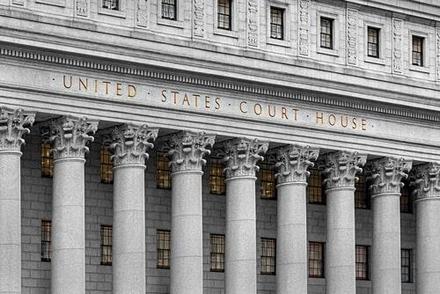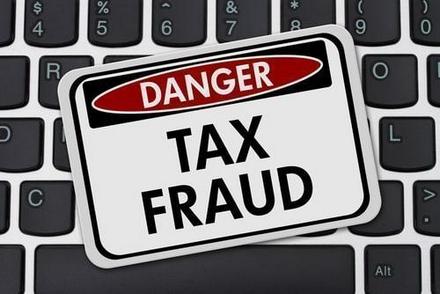TELEPHONES ANSWERED 24 HOURS A DAY
Recent Blog Posts
What to Do if Your Spouse is Charged with a Federal Crime
 Learning that your loved one has been charged with a federal crime is very scary. You want to help, but you do not know how to do it, or what steps to take. You may also want to post bond as soon as possible, so your spouse can come back home to you. The federal justice system though, is very different from the state justice system most people think of in criminal cases and so, it is important to understand those differences, and what you should do after your spouse is arrested.
State Court vs. Federal Court
Many people are familiar with the state court system and how it works, but are unaware that federal court is very different. Federal convictions typically carry much harsher consequences, and the procedural rules also vastly differ. As such, you need to work with a criminal defense lawyer that has the necessary experience in federal court to give your spouse the best chance possible.
Posting Bond
One of the biggest differences between state and federal courts is that you will likely be unable to post bond right away for your spouse. State courts often allow people to post bail or bond and remain at home until the date of their court hearing. Federal courts do not typically follow this procedure.
The Federal Rules of Criminal Procedure state that defendants must appear in their first detention hearing within three days of arrest. At the hearing, they will be read the charges they are facing, and the court will determine if the individual is a flight risk, or if they pose a threat to others. After determining this, the judge will determine whether bond is appropriate.
Certain federal offenses do not allow defendants or their loved ones to post bond. These include certain violent crimes, drug offenses that carry a prison sentence of ten years or more, felonies committed against a minor, and felonies committed with a firearm.
Steps to Take to Help Your Spouse’s Case
If your loved one cannot post bond, it will be even more important that you understand the steps you should take. The first step is to keep copies of all documentation. You may receive copies of warrants, police reports, and other paperwork during and after your spouse’s arrest. It is crucial that you keep all of these, as they will contain information about where your spouse is detained.
Secondly, you must speak with a federal criminal defense lawyer that can help with your spouse’s case. Remember that the lawyer will work for your spouse, not you. Although it is okay to ask questions, remain understanding if there are certain aspects of the case the lawyer cannot discuss with you.
Our Chicago Federal Criminal Defense Lawyer Is Here to Help
Learning that your loved one has been charged with a federal crime is very scary. You want to help, but you do not know how to do it, or what steps to take. You may also want to post bond as soon as possible, so your spouse can come back home to you. The federal justice system though, is very different from the state justice system most people think of in criminal cases and so, it is important to understand those differences, and what you should do after your spouse is arrested.
State Court vs. Federal Court
Many people are familiar with the state court system and how it works, but are unaware that federal court is very different. Federal convictions typically carry much harsher consequences, and the procedural rules also vastly differ. As such, you need to work with a criminal defense lawyer that has the necessary experience in federal court to give your spouse the best chance possible.
Posting Bond
One of the biggest differences between state and federal courts is that you will likely be unable to post bond right away for your spouse. State courts often allow people to post bail or bond and remain at home until the date of their court hearing. Federal courts do not typically follow this procedure.
The Federal Rules of Criminal Procedure state that defendants must appear in their first detention hearing within three days of arrest. At the hearing, they will be read the charges they are facing, and the court will determine if the individual is a flight risk, or if they pose a threat to others. After determining this, the judge will determine whether bond is appropriate.
Certain federal offenses do not allow defendants or their loved ones to post bond. These include certain violent crimes, drug offenses that carry a prison sentence of ten years or more, felonies committed against a minor, and felonies committed with a firearm.
Steps to Take to Help Your Spouse’s Case
If your loved one cannot post bond, it will be even more important that you understand the steps you should take. The first step is to keep copies of all documentation. You may receive copies of warrants, police reports, and other paperwork during and after your spouse’s arrest. It is crucial that you keep all of these, as they will contain information about where your spouse is detained.
Secondly, you must speak with a federal criminal defense lawyer that can help with your spouse’s case. Remember that the lawyer will work for your spouse, not you. Although it is okay to ask questions, remain understanding if there are certain aspects of the case the lawyer cannot discuss with you.
Our Chicago Federal Criminal Defense Lawyer Is Here to Help
If your spouse has been arrested and is facing federal charges, there is little doubt that you want to help them as much as possible. At the Law Offices of Hal M. Garfinkel, our experienced Chicago federal criminal defense lawyer knows what a difficult time this is for you, and wants to make it easier on your family. Call us today at 312-629-0669 or contact us online to learn more about how we can help your spouse with their charges.
FAQs About Changing Attorneys in the Middle of Your Case
 Too often, people are charged with a federal offense, such as tax evasion or drug trafficking, and they quickly hire a lawyer that was recommended to them, or that they heard about from an advertisement. As the case progresses, the lawyer’s shortcomings become quite evident and the accused individual starts to lose trust in their attorney. In these instances, people often want to change their lawyers, but wonder if they are allowed to under the law. This is just one question that arises when people want to change lawyers. Below are other frequently asked questions about hiring a new attorney, and the answers to them.
Am I Allowed to Switch Lawyers During My Case?
The Constitution of the United States provides all Americans the right to have an attorney of their choosing represent them during their case. As such, you can change lawyers nearly any time you would like. However, there are times when a judge will not allow you to change lawyers, such as right before your trial begins if the judge feels it would not serve justice and the change would only delay the case.
How Do I Know if I Should Change Lawyers?
The answer to this question is largely subjective because it relies on how you feel about your attorney. Do you feel as though your lawyer does not have the skillset your case requires? Do you speak more to your lawyer’s paralegals and secretaries than you do your attorney? Have you lost trust that your lawyer is working in your best interests? All of these are signs that you should change lawyers but generally speaking, any time you are not comfortable with your lawyer, it might be time to seek a second opinion.
How Do I Know that a Lawyer is Better than My Current One?
The most important thing to ask a potential new lawyer about is their experience. Ask how many cases they have handled that are similar to yours, and about the outcomes, they achieved in those cases. This will tell you if the lawyer can handle your case, and will ensure they are familiar with the law regarding your case.
Do I Have to Tell My Old Lawyer that I Chose a New One?
You should never sever ties with your current attorney until you have spoken to a new one. Once you start working with your new lawyer, they can draft a letter informing your current lawyer of the change and ask that they transfer your case file to you, or to your new attorney.
Need a Second Opinion? Our Chicago Federal Criminal Defense Lawyer Can Help
Too often, people are charged with a federal offense, such as tax evasion or drug trafficking, and they quickly hire a lawyer that was recommended to them, or that they heard about from an advertisement. As the case progresses, the lawyer’s shortcomings become quite evident and the accused individual starts to lose trust in their attorney. In these instances, people often want to change their lawyers, but wonder if they are allowed to under the law. This is just one question that arises when people want to change lawyers. Below are other frequently asked questions about hiring a new attorney, and the answers to them.
Am I Allowed to Switch Lawyers During My Case?
The Constitution of the United States provides all Americans the right to have an attorney of their choosing represent them during their case. As such, you can change lawyers nearly any time you would like. However, there are times when a judge will not allow you to change lawyers, such as right before your trial begins if the judge feels it would not serve justice and the change would only delay the case.
How Do I Know if I Should Change Lawyers?
The answer to this question is largely subjective because it relies on how you feel about your attorney. Do you feel as though your lawyer does not have the skillset your case requires? Do you speak more to your lawyer’s paralegals and secretaries than you do your attorney? Have you lost trust that your lawyer is working in your best interests? All of these are signs that you should change lawyers but generally speaking, any time you are not comfortable with your lawyer, it might be time to seek a second opinion.
How Do I Know that a Lawyer is Better than My Current One?
The most important thing to ask a potential new lawyer about is their experience. Ask how many cases they have handled that are similar to yours, and about the outcomes, they achieved in those cases. This will tell you if the lawyer can handle your case, and will ensure they are familiar with the law regarding your case.
Do I Have to Tell My Old Lawyer that I Chose a New One?
You should never sever ties with your current attorney until you have spoken to a new one. Once you start working with your new lawyer, they can draft a letter informing your current lawyer of the change and ask that they transfer your case file to you, or to your new attorney.
Need a Second Opinion? Our Chicago Federal Criminal Defense Lawyer Can Help
Changing lawyers in the middle of your case is certainly not ideal, but sometimes it is necessary. If you feel as though your current lawyer is not the right one for the job, our skilled Chicago federal criminal defense lawyer at the Law Offices of Hal M. Garfinkel can help. Attorney Garfinkel is well-versed in all areas of federal law and can answer all your questions about switching lawyers. When you need a second opinion, call us at 312-629-0669 or contact us online to schedule a free consultation and to learn more about how we can help.
Can You Post Bail for Federal Charges?
 If you have been charged with a drug crime, a weapons offense, or any other federal crime, you may be wondering if you can post bail so you can remain out of jail until a decision is made at trial. Most people think that as long as they have the money, it is fairly easy to get bail. This is mainly due to the fact that when most people think of jail, they think of state facilities. The federal justice system is much different, and that includes how decisions are made about bail, bond, and pretrial release.
Initial Hearing
Shortly after being charged, you will meet with a Pretrial Services Officer. During an interview, the officer will ask you about your entire background. Afterward, the officer will make a recommendation to the court about whether you need an attorney appointed, and whether you should be detained or released while the case is pending. The judge will review the recommendations of the officer and hear arguments from you and the prosecution pertaining to your pre-trial release.
Bail
Generally speaking, bail is a term used to describe money paid court so you can be released from jail prior to your trial. In state courts, bail is quite common, but it is quite rare in federal court. In federal court, the issue of pretrial release does not revolve around one person’s ability to pay, but rather a number of conditions the court may impose to ensure you return to court.
Bond
The conditions the court imposes to ensure you return to court are known as bond. Bond can incorporate a number of conditions you must meet until the end of your trial. A judge will determine the bond conditions based on five premises. These are that you will:
If you have been charged with a drug crime, a weapons offense, or any other federal crime, you may be wondering if you can post bail so you can remain out of jail until a decision is made at trial. Most people think that as long as they have the money, it is fairly easy to get bail. This is mainly due to the fact that when most people think of jail, they think of state facilities. The federal justice system is much different, and that includes how decisions are made about bail, bond, and pretrial release.
Initial Hearing
Shortly after being charged, you will meet with a Pretrial Services Officer. During an interview, the officer will ask you about your entire background. Afterward, the officer will make a recommendation to the court about whether you need an attorney appointed, and whether you should be detained or released while the case is pending. The judge will review the recommendations of the officer and hear arguments from you and the prosecution pertaining to your pre-trial release.
Bail
Generally speaking, bail is a term used to describe money paid court so you can be released from jail prior to your trial. In state courts, bail is quite common, but it is quite rare in federal court. In federal court, the issue of pretrial release does not revolve around one person’s ability to pay, but rather a number of conditions the court may impose to ensure you return to court.
Bond
The conditions the court imposes to ensure you return to court are known as bond. Bond can incorporate a number of conditions you must meet until the end of your trial. A judge will determine the bond conditions based on five premises. These are that you will:
- Not commit a crime
Is Looting a Federal Offense?
 Protests have erupted all over the country with protesters calling for equality after the death of George Floyd, an unarmed African-American man who was killed while in police custody. Although many of the protests have remained peaceful, looting has also occurred in many cities. Buildings have been burned down, storefronts have been vandalized, and mass theft has occurred. Protesters and looters alike have both been arrested with many asking whether looting is a federal crime. The answer to that question is that it depends on the facts of a specific case. While some of the crimes that result from looting may be charged as a federal offense, many people are also criticizing law enforcement for overcharging behavior that otherwise would not be considered federal jurisdiction.
Offenses Associated with Looting
Looting in and of itself is not a criminal term, but a person may be charged with a specific act that results from looting. The most common offenses associated with looting include:
Protests have erupted all over the country with protesters calling for equality after the death of George Floyd, an unarmed African-American man who was killed while in police custody. Although many of the protests have remained peaceful, looting has also occurred in many cities. Buildings have been burned down, storefronts have been vandalized, and mass theft has occurred. Protesters and looters alike have both been arrested with many asking whether looting is a federal crime. The answer to that question is that it depends on the facts of a specific case. While some of the crimes that result from looting may be charged as a federal offense, many people are also criticizing law enforcement for overcharging behavior that otherwise would not be considered federal jurisdiction.
Offenses Associated with Looting
Looting in and of itself is not a criminal term, but a person may be charged with a specific act that results from looting. The most common offenses associated with looting include:
- Possession of destructive devices
When an Internet Search Turns Into a Crime
 Billions of people use search engines such as Google every day to look up information, videos, local businesses, and more. Most searches conducted are fairly innocent and will not attract the interest of federal authorities, such as the FBI. Unfortunately, there are some search terms that could catch their attention, and that may even leave you facing federal criminal charges. It is important to know what these search terms are, as even just searching for mere interest's sake may not provide a valid defense.
Child Pornography
Generally speaking, viewing pornography online is not a criminal act. However, when pornographic material depicts children under the age of 18, it is considered child pornography, a federal offense that state and federal law enforcement officials take very seriously. Searching for child pornography, even if you do not view it, may also be considered a crime as those searches will remain in your history and could technically mean that you were in possession of the material.
In some cases, a person may view pornographic material depicting children by accident. Still, proving your actions were accidental is extremely challenging.
Other Illegal Searches
Although child pornography may be the most commonly thought of search that is illegal, there are other terms that are considered illegal as well. Any term related to terrorist acts, such as how to build a bomb, are also flagged by federal authorities and are heavily investigated. Agencies such as the FBI will likely look at the rest of your search history to try and determine if you were engaging in illegal activity.
Copyright material is also found extensively online. In fact, most of the content online is protected by federal law. Streaming this material or downloading it to your computer is also considered a criminal offense, as it violates federal law.
Penalties for Illegal Searches
The penalties for conducting an illegal search, if convicted, will vary depending on the actual offense committed. Child pornography and searches related to terrorism acts carry the heaviest sentences, with jail time and high fines likely possibilities. Many people think that violating copyright law may not be a major offense, but that crime too, can result in heavy penalties. Fines associated with violating copyright law are quite steep, and it is possible to face jail time, as well.
Any time someone is accused of conducting an illegal search, their computer will likely be seized so law enforcement can delve deeper into their history. Individuals will also be questioned extensively, and perhaps even pressured or coerced into admitting that they committed an act when they did no such thing.
Our Chicago Federal Criminal Defense Lawyer is Here to Help
Billions of people use search engines such as Google every day to look up information, videos, local businesses, and more. Most searches conducted are fairly innocent and will not attract the interest of federal authorities, such as the FBI. Unfortunately, there are some search terms that could catch their attention, and that may even leave you facing federal criminal charges. It is important to know what these search terms are, as even just searching for mere interest's sake may not provide a valid defense.
Child Pornography
Generally speaking, viewing pornography online is not a criminal act. However, when pornographic material depicts children under the age of 18, it is considered child pornography, a federal offense that state and federal law enforcement officials take very seriously. Searching for child pornography, even if you do not view it, may also be considered a crime as those searches will remain in your history and could technically mean that you were in possession of the material.
In some cases, a person may view pornographic material depicting children by accident. Still, proving your actions were accidental is extremely challenging.
Other Illegal Searches
Although child pornography may be the most commonly thought of search that is illegal, there are other terms that are considered illegal as well. Any term related to terrorist acts, such as how to build a bomb, are also flagged by federal authorities and are heavily investigated. Agencies such as the FBI will likely look at the rest of your search history to try and determine if you were engaging in illegal activity.
Copyright material is also found extensively online. In fact, most of the content online is protected by federal law. Streaming this material or downloading it to your computer is also considered a criminal offense, as it violates federal law.
Penalties for Illegal Searches
The penalties for conducting an illegal search, if convicted, will vary depending on the actual offense committed. Child pornography and searches related to terrorism acts carry the heaviest sentences, with jail time and high fines likely possibilities. Many people think that violating copyright law may not be a major offense, but that crime too, can result in heavy penalties. Fines associated with violating copyright law are quite steep, and it is possible to face jail time, as well.
Any time someone is accused of conducting an illegal search, their computer will likely be seized so law enforcement can delve deeper into their history. Individuals will also be questioned extensively, and perhaps even pressured or coerced into admitting that they committed an act when they did no such thing.
Our Chicago Federal Criminal Defense Lawyer is Here to Help
Few people consider that conducting a search online could result in criminal charges. Unfortunately, it happens all too frequently. If you have been accused of conducting an illegal online search and are facing charges, call our skilled Chicago federal criminal defense lawyer at the Law Offices of Hal M. Garfinkel today. Attorney Garfinkel knows that not everyone charged with a federal crime is guilty, and he has the necessary experience to help defendants beat the most serious federal charges. Call us at 312-629-0669 or contact us online to schedule a free consultation and to learn more about how he can help.
Stalking Can Quickly Become a Federal Offense
 Many people are familiar with the term ‘stalking,’ but because this offense is commonly charged at the state level, individuals are often surprised to learn that they are facing federal charges. Under certain conditions, a stalking charge can quickly turn into a federal offense and when they do, it is important to speak to a lawyer experienced with the federal criminal justice system.
The Definition of Stalking Under Federal Law
The federal statute that governs stalking defines the offense as:
Many people are familiar with the term ‘stalking,’ but because this offense is commonly charged at the state level, individuals are often surprised to learn that they are facing federal charges. Under certain conditions, a stalking charge can quickly turn into a federal offense and when they do, it is important to speak to a lawyer experienced with the federal criminal justice system.
The Definition of Stalking Under Federal Law
The federal statute that governs stalking defines the offense as:
- Placing another person in reasonable fear of serious bodily injury or death to themselves, their family members, spouse, or intimate partners, or
- Causing, or attempting to cause, significant emotional distress to the victim, or
- Acting with the intent to injure, harass, kill, or intimidate the victim
- Placing a victim under surveillance in an effort to injure, harass, kill, or intimidate them
Are You Under Investigation for Prescription Drug Fraud?
 Pharmacists help people every day, providing the necessary medication that helps patients with their illnesses and injuries. Few pharmacists expect to receive a target letter or a federal subpoena and when they do, it is easy to imagine the worst-case scenarios. While pharmacists are often the target of prescription drug fraud investigations, it is important not to panic. There are defenses available for these cases and ways you can protect yourself.
Pharmacists help people every day, providing the necessary medication that helps patients with their illnesses and injuries. Few pharmacists expect to receive a target letter or a federal subpoena and when they do, it is easy to imagine the worst-case scenarios. While pharmacists are often the target of prescription drug fraud investigations, it is important not to panic. There are defenses available for these cases and ways you can protect yourself.
Becoming Involved in the Government’s Investigation
Once you learn that you are under federal investigation, it is easy to want to wait it out, hope for the best, and see what happens. This is a big mistake. The Department of Justice (DOJ) and the Drug Enforcement Administration (DEA) are overzealous in their investigations and they cannot go unchecked. A lawyer can ensure that the investigation is being conducted in accordance with the law and that you do not provide more to the investigators than you are legally obligated to.
What Are the Most Common Federal Offenses?
 Federal offenses are often misunderstood, mainly because people are more familiar with state crimes that are prosecuted at the state level. Federal crimes are those that violate federal law and, although state law often mirrors this law, there are times when the crime has certain elements that make it a federal offense. A drug crime, for example, violates state law but if the crime involves a border crossing, it becomes a federal crime. Drug offenses are one of the most common federal crimes, as are weapons crimes and white-collar crimes.
Federal offenses are often misunderstood, mainly because people are more familiar with state crimes that are prosecuted at the state level. Federal crimes are those that violate federal law and, although state law often mirrors this law, there are times when the crime has certain elements that make it a federal offense. A drug crime, for example, violates state law but if the crime involves a border crossing, it becomes a federal crime. Drug offenses are one of the most common federal crimes, as are weapons crimes and white-collar crimes.
Drug Crimes
Any offense that violates the federal Controlled Substances Act is considered a federal crime. Drug crimes are some of the most common offenses at the state level too, but there are some significant differences between the two. For example, while many states have legalized marijuana use, even in these states it is illegal to consume the drug on federal property. If someone was found consuming marijuana on federal property, they could face federal charges, although it would be unlikely.
How Tax Fraud Affects Accountants
 When most people think of tax fraud, they typically think of a person that tries to avoid paying the proper taxes they owe and then get charged with tax evasion. While that is certainly one type of criminal offense involving taxes, there are others as well. These offenses fall under the umbrella term of tax fraud and many people can be charged with these crimes, including accountants, without even realizing that they engaged in criminal activity.
When most people think of tax fraud, they typically think of a person that tries to avoid paying the proper taxes they owe and then get charged with tax evasion. While that is certainly one type of criminal offense involving taxes, there are others as well. These offenses fall under the umbrella term of tax fraud and many people can be charged with these crimes, including accountants, without even realizing that they engaged in criminal activity.
What Is Tax Fraud?
Tax fraud, in its simplest terms, occurs when a person makes intentional misrepresentations, or false statements, on a tax return, or a person falsifies tax documents. Tax evasion, on the other hand, refers to using illegal means to avoid paying taxes. Tax fraud is governed under 26 U.S.C. 7206 (1) and under this statute, a person may face charges of tax fraud if they:
- Created and submitted a return, statement, or other legal documents which contains false statements about an important matter,
What Is the Federal Crime of Perjury?
 In its most basic form, perjury is defined as lying under oath and it is a federal offense. There are two federal statutes that define perjury. The first outlines general perjury, while the other defines making false declarations before a court or grand jury. Although these statutes differ slightly, with one requiring a federal court proceeding, the definition of the act of perjury largely remains the same. That definition may seem simple, but there are five elements that must be met in order for the prosecution to secure a conviction.
In its most basic form, perjury is defined as lying under oath and it is a federal offense. There are two federal statutes that define perjury. The first outlines general perjury, while the other defines making false declarations before a court or grand jury. Although these statutes differ slightly, with one requiring a federal court proceeding, the definition of the act of perjury largely remains the same. That definition may seem simple, but there are five elements that must be met in order for the prosecution to secure a conviction.
Perjury Must Happen Under Oath
A person can make false statements when they are not under oath and it is not considered perjury. For an offense to have been committed, a witness must have promised to provide honest statements to a person that has the authority to administer the oath, such as a court official. The proceeding in which someone takes an oath must also be considered “competent,” or comply with the law.




